Young, rebellious and the Myanmar military’s ‘worst enemy’
Young people are leading opposition to the coup and have not been deterred by the military’s harassment, surveillance and brutality.
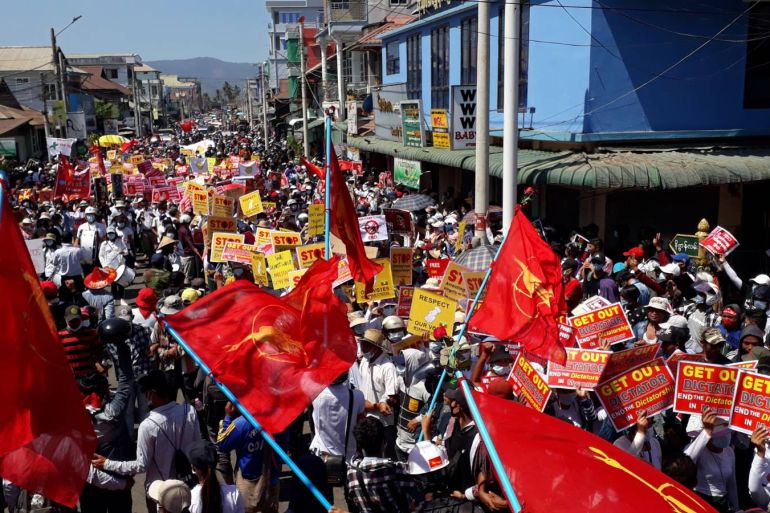
Before the military seized power from the civilian government in Myanmar early last year and proceeded to kill and arrest thousands, Hnin Si enjoyed a peaceful life in the southern city of Dawei.
During the week, she would go to her office; at the weekend, she would explore nearby nature on her bicycle or go hiking with friends in the mountains overlooking the Andaman Sea.
Keep reading
list of 4 itemsAung San Suu Kyi, Australian economic adviser jailed in Myanmar
Meta owes Rohingya reparations for Myanmar violence, says Amnesty
Malaysian PM laments lack of UN action on Myanmar crisis
Those days are gone.
As the military attempts to extinguish widespread opposition to its rule, it has targeted its crackdown on the young people who make up the core of the resistance. Adding to the burden facing Myanmar’s young people, the country’s economy is collapsing, and their dreams of furthering their education are vanishing.
“The junta is treating every single youth as their worst enemy,” said Ko Bo Kyi, joint secretary of the Assistance Association for Political Prisoners. The rights documentation group says more than 900 people aged between 16 and 35 have been killed in the military’s crackdowns on the pro-democracy movement and more than 2,800 in that age group arrested.
“The youth should be the future of the country. And yet, we have this so-called military detaining, torturing, and killing them,” added Ko Bo Kyi. “It is destroying our country and future society.”
Al Jazeera spoke to eight people in their 20s and early 30s from Myanmar’s southernmost Tanintharyi region, where local armed resistance groups have gathered strength over the past year and the military has responded by increasing its surveillance, killings and arrests.
Those interviewed described cities and towns bereft of young people, who have largely fled the country, sought shelter in areas under the control of armed resistance groups, or joined the resistance themselves. Those who remain in areas under military control said they live in fear and desperation.
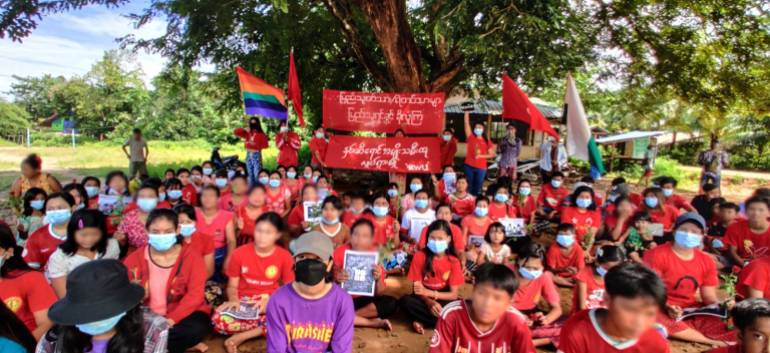
Hnin Si, who is in her late 20s, protested peacefully and started a Facebook page to raise funds for striking civil servants in the weeks after the coup, but now hardly goes outside or posts online at all. She recently hid at a friend’s house for days after learning that a close contact had been arrested for providing humanitarian support to people forced from their homes by the fighting.
“We, young people, are feeling like we are stuck here and our future is hopeless,” she said.
All people interviewed for this report, with the exception of one protest leader who requested his real name be used, have been identified by their requested nicknames or given pseudonyms due to the risk of military reprisals.
No safe place
Within days of the coup in February 2021, Myanmar had erupted into peaceful demonstrations, but by last April, the military’s use of lethal force on hundreds of unarmed civilians had driven young people across the country to take up arms instead.
As the public has adapted its revolutionary tactics, the military has worked to ensure that there are few safe places for anyone who opposes its rule. Soldiers and police commonly raid the homes of suspected dissidents; they also go house to house checking for overnight guests who have failed to register with the authorities.
To lure opponents out of hiding, the military has also gone after their family members and associates. Since the coup, more than 450 people, including elderly parents and young children, have been arrested in this manner, according to AAPP data.
Security forces also stop people randomly on the street and search through their phones for evidence of support for the resistance, and at least seven people have been fatally shot for driving through checkpoints without stopping, according to AAPP. It also identifies one person who was gunned down for riding on the back of a motorcycle, which has been outlawed for males since November.
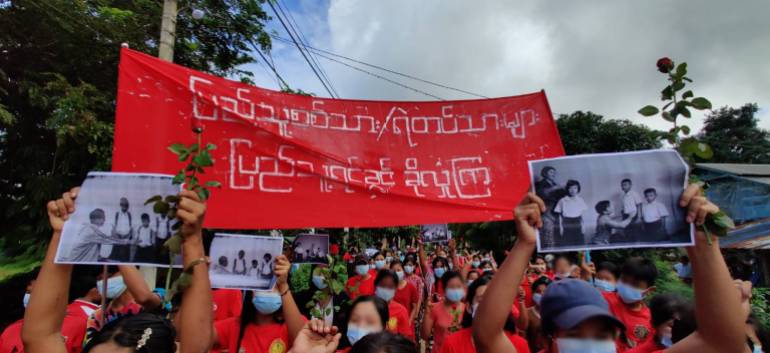
Online activity is also dangerous. More than 200 people have been arrested this year on charges of incitement and “terrorism” for social media posts, while seven people were sentenced to 7 to 10 years on charges of “funding terrorism” for making mobile bank transfers of less than $10 to armed resistance groups, according to Radio Free Asia.
In Tanintharyi, where clashes between resistance groups and the military began last August, the situation has deteriorated dramatically. A report published this month by Southern Monitor, a local research group focusing on Tanintharyi, found that the risks of being shot, arrested or extorted for money by military forces had increased.
“Young people are the most involved in the current armed conflict, and they are also the most affected group,” a spokesperson told Al Jazeera in a written reply to questions.
In rural Tanintharyi, the military has also burned homes, fired artillery into civilian areas and occupied villages, displacing 23,000 people according to the United Nations. Southern Monitor reported that 7,000 of those displaced remain unable to return home.
Noe Noe, 21, fled her village of Taku this March as fighting escalated around her.
Two months later, four men’s bodies were found near the village. They had been decapitated after allegedly being captured by the military during the fighting. The residents of 20 nearby villages evacuated due to the violence. “There is no one left in my village,” said Noe Noe, who now lives in a camp. “My biggest fear now is that the military will attack the place where I am staying. If they do, we have nowhere else to run.”
Protests continue
Even though the military has already killed more than 2,200 people and arrested more than 15,000 in its crackdowns on the pro-democracy movement, some protest groups continue to hold peaceful demonstrations. “We even protest in these complicated, dangerous times,” said Raymond, a protest leader in Tanintharyi’s Launglone township who takes part in rallies several times a week.
Before the coup, Raymond had planned to study abroad; now, he moves from place to place to avoid arrest. His protest group relies on community donations to meet their basic needs, but at a time of soaring commodity prices, the crashing value of the kyat and a bleak formal economy, they can barely top up their mobile data or buy petrol to drive their motorbikes to protest sites. At times, they do not even have enough to eat; sometimes, they have to scatter into the jungle to avoid military soldiers.
“To live in Myanmar under dictatorship is like living in hell,” said Raymond.
Rights groups and the media have documented the military’s systematic torture of political prisoners since the coup, but Raymond said his biggest fear is that if he were to be arrested, he would not be able to continue protesting.
His fellow protest leader, Minlwin Oo, has faced numerous close encounters with soldiers.
One of hundreds of thousands of striking civil servants, the former government engineer organised some of the first protests in Dawei. In March, the military raided his safe house and arrested eight people. By April, he had relocated to Launglone and begun leading protests there instead.
In November, soldiers ransacked his family’s house in Dawei and arrested his mother. According to Minlwin Oo’s account, they beat her with their guns and interrogated her for four days before releasing her.
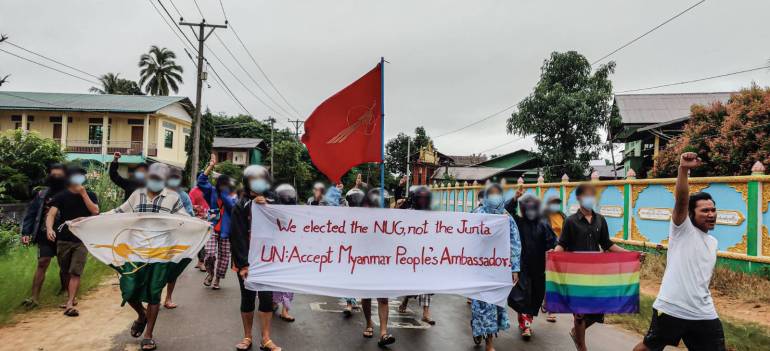
More recently, a military-affiliated militia has threatened Minlwin Oo and his family on Facebook. “[They] warned me not to continue striking or any other activities, and said they would kill me and my family members if I continued,” he said. In the past year, such groups have killed numerous people associated with the resistance, including 18 people in southern Myanmar, according to a report published by the Human Rights Foundation of Monland.
Although Minlwin Oo worries for the safety of his wife and small child, he has resolved not to back down. “We cannot stay silent. We have to do our work despite these threats,” he said. “All families’ future plans and dreams in my country have been destroyed … If we don’t fight against military dictatorship, we will never be free.”
An exodus of young people
Few others are willing to stay, and Tanintharyi has experienced an exodus of young people.
“Many youth who took part in anti-coup activities had to flee,” said Stee, who is 24. “Not many young people [still] live in the cities.”
Although she protested with her university student union in Tanintharyi’s southern city of Myeik in the weeks after the coup, by April, she had left the city and begun moving from place to place in nearby villages. Earlier this year, she moved to a so-called “liberated area” under the control of an armed resistance group, where she now volunteers to support the education and humanitarian needs of conflict-displaced people.
Other young people have left the country altogether. Shine, 25, fled Myeik last March after a convoy of seven trucks arrived at his house to arrest him for his role in leading protests. While his parents took shelter in a nearby village, Shine hid on a rubber plantation. After two more close encounters with military forces, he hired an agent to arrange his escape to Thailand this May.
Before the coup, he had once flown to Thailand to represent his university at a technology conference, but this time, he entered the country on foot and is now washing dishes on an island. “I want to study, but here I am working at a restaurant,” he said. “Whenever I think about it, I feel upset and angry at the military and I also feel like I lost my future.”
Although he is no longer on the run from Myanmar soldiers and police, he now fears encountering Thai authorities, who often deport groups of undocumented refugees or migrants. “I took an illegal route. If I were to get arrested and the Thai government were to return me to the military’s hands, I can’t imagine what would happen to me,” he said.
He also worries about his parents’ safety — this year, fighting has escalated in the area where they are living. “Sometimes I feel guilty when I think about how my family suffered because of me,” he said. His sense of guilt is compounded when he talks to his peers back in the country. “My friends said that I left for my own good, and people also tell me that I am not part of the revolution,” he said.
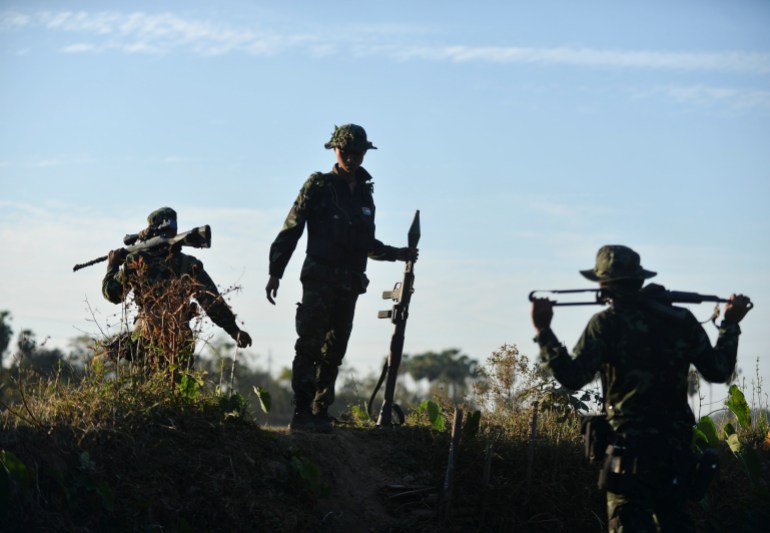
Many young people have also joined the armed resistance. Thar, 32, fled Myeik for a liberated area last March, after four military trucks surrounded the office where she worked as a journalist as she hid inside. At the time, the military was scaling up its crackdowns on the media. In total, it has arrested more than 130 journalists since the coup.
Unable to continue her journalism from the liberated area due to poor internet access, Thar trained as a medic with an armed resistance group instead. This April, she was deployed to the battlefront near her village. “I heard that my father was sick in bed, but I couldn’t see him or tend to him. I was really sad, but I encouraged myself that I am serving people for a greater cause,” she said.
By then, her family had publicly disowned her — a measure taken by hundreds of families since the coup to avoid retaliation from the military against family members. “My parents want me to go to Thailand where my relatives are, but I don’t want to go,” said Thar. “Only if we fight can we be free from military enslavement.”
Zin Min Htet contributed to this report.